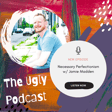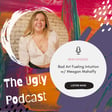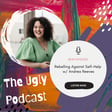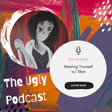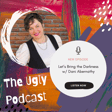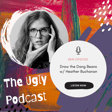Embracing Imperfection in Creative Work
00:00:03
Speaker
Welcome to the Ugly Podcast. I'm your host, Lauren Alexander, she, they, and this is the place where creatives are encouraged to make messy, ugly art and let go of perfectionism.
00:00:14
Speaker
I started this podcast with my creative partner, Emerson, and we've since grown into our businesses. And this podcast is now evolving into a space where I interview other creatives to discuss our creative processes and how we navigate the mental mind field of creativity. This podcast serves as a reminder that you and your art get to be whatever the hell you want to be, ugly and all.
00:00:41
Speaker
So welcome back to the Ugly Podcast, another beautiful sunshiny day. Just kidding, it's cloudy. Thank you everybody for coming back to listen.
Guest Introduction: Erica Steeves
00:00:52
Speaker
I have with me a new friend from this year who I met in the freelance editors club.
00:00:58
Speaker
She is a freelance copy editor who works primarily with indie authors of speculative fiction. She also is the lead editor for the indie publisher House of Zolo, which strives to publish powerful speculative literature that reimagines the world and our place in it. She loves editing and reading science fiction, dystopia, horror, and on her downtime, she enjoys making art. So welcome. Would you please state your first and last name and your pronouns, please?
00:01:28
Speaker
Sure. My name is Erica Steeves. My pronouns are she, her. Thank you very much. Welcome.
Perfectionism Origins in Gymnastics
00:01:36
Speaker
Thank you. This is very exciting and also very terrifying, but I'm super excited that you asked me to come on the podcast.
00:01:43
Speaker
I'm really glad that you're here because I connected with you so much as soon as we met and we started talking about perfectionism and you were like, oh yes, I also am afraid of those things. I'm like, great, we are kindred spirits. I feel like we must have kind of twin perfectionisms or something. I think we do. Also because of potentially our gymnastics upbringing, childhood stuff. I don't know.
00:02:11
Speaker
Actually, not maybe. I think there is a very obvious connection.
00:02:16
Speaker
I think there absolutely is. Yeah. Gymnastics is so, so perfectionistic. And it just, especially just like that drilling down of like, you do it over and over and over and over and over again. It's never good enough. And yep.
Influence of Gymnastics on Perfectionism
00:02:30
Speaker
Yep. And then the constantly being judged. Yeah. Yeah. So much could be said about that. And it actually, I only really recognize the roots of my perfectionism in gymnastics when I did your creating through perfectionism.
00:02:45
Speaker
workshop I guess last summer and you had a question in there like when does your perfectionism really come to the fore like at the beginning of a project in the middle or at the end and I realized it was constantly at the very end and it was that the the fear of now sharing or showing or being in the spotlight for whatever I was doing and then I immediately thought of how so much of my trauma around competition
00:03:15
Speaker
in gymnastics and like having to like after all the drills and all the practice and all the you know all the stuff you have to now present you have to now or compete and people are literally holding up you know numbers describing your worth to you oh well you did and i was just like wow that is very connected to that
00:03:39
Speaker
And also to mention like I remember really bombing those competitions. I would I would really freeze under pressure and um, I think I developed this fear of Yeah fear of putting myself out there because you know I felt I had this story of like i'm no good I'm no good when I show people what i'm doing or i'm really good when it's just for me and i'm practicing and i'm enjoying what i'm doing but when
Linking Gymnastics to Creative Struggles
00:04:07
Speaker
when it's you know when a spotlight is shone on me I freeze and I'm awkward and all these stories developed around that I think so it was really interesting in your workshop to realize that and realize like wow there's a real connection to that stuff in my childhood and as much as I did I honestly did enjoy features of gymnastics and features of
00:04:32
Speaker
And I still carry it to this day, being a very embodied person. I love yoga. I love meditation. I love working out, all that stuff. But the piece around the perfection of what you're doing, that's what I want to let go of. And it shows up in so many aspects of my life, as I'm sure we will get into.
00:04:55
Speaker
Yes, we will. And we'll get into that right
Perfectionism in Editing Work
00:04:58
Speaker
now. So how, how does perfectionism show up in your life? How has it over the years? Especially when it comes to your business and writing and putting together your, your House of Zolo stuff, like how does that, how does perfectionism show up for you? Well, I can give you a very immediate and timely example in my editing. So today is
00:05:25
Speaker
potentially tomorrow morning but today is the deadline for a very large project that I've been working on for the past like four weeks solid copy editing and as I said before it's the end it's the like pressing send and submitting something to the client that I'm I get really nervous and really perfectionistic about and so I get kind of trapped in this loop of
00:05:51
Speaker
Did I catch everything? Did I miss anything? Oh, let me do another round. Let me do another check for that. Oh, no, no, no, let me do another one. I'm like just the doubts and all that stuff, all of that double checking.
00:06:07
Speaker
Even though I know what I've done is to the best of my abilities, and I'm really proud of my work, there's that nagging perfectionism of like, wait a minute. It's like this little doubt on your shoulder. Like, wait a minute. I don't think you did. Did you check that? It's like, I can't handle you right now.
Managing Perfectionism with Mantras
00:06:24
Speaker
I also, that just reminded me, I get like echo perfectionistic talk where like,
00:06:30
Speaker
I had a thought a few days ago about this project and like, oh, you need to check this thing. And then I'll check it and I'll be like, okay, I got it. And then a few days later, I get an echo of that of like, are you sure you checked that thing? I don't think you checked that thing. I'm like, I know I checked it, but I guess I have to check it again. I get that too. And I think it reminds me of, and maybe I don't know what this is, but it reminds me of like, wait,
00:06:56
Speaker
Did you lock the front door? Yes, yes. Wait, wait, did you turn the oven off? Did you turn the oven off? Like that voice of like, yes, I did. But now I don't trust myself. Thank you. Yeah. Oh, yes, it just completely makes you. Yeah, yourself. Yes. But yeah, I want how I get around that honestly, is simply to
00:07:22
Speaker
I forget what my mantra is right now for this, but it's simply to say something to myself. I am proud of what I've done here. I am happy with how I have edited this manuscript. This is the best that I could do
00:07:41
Speaker
And I'm really happy with this. It's never going to be perfect. It's impossible to be perfect. And also no one is expecting you to be perfect. So, you know, I release all of this and yes, I'm ready to, and I'm really excited to submit this to my client. Like I have to kind of pep talk myself out of this state of perfectionism, which I'm currently in.
Developing Tolerance for Imperfection
00:08:05
Speaker
And I think it's important to note that
00:08:09
Speaker
You never really totally get beyond that if you have perfectionistic tendencies, but you can learn to notice it when it happens and know when it happens, why it happens, and kind of develop strategies for building up your confidence and your tolerance for... Not tolerance, that's the wrong word, but...
00:08:31
Speaker
I don't know, your ability to navigate it. I think tolerance is actually a really good word. I immediately resonated with that when you said tolerance because it is teaching your body how to have a tolerance for imperfect things. Yeah, I actually like that now that you said it. And that's where I started with ugly art. I was able to tolerate imperfection because I labeled it ugly.
00:09:00
Speaker
And that was step one of like, OK, I can tolerate this, but I still can't tolerate other forms of imperfection. But slowly as I practice that and as I learned lessons and as I kind of started to extend it past art and into just creativity and life and writing and all these things, then my tolerance continues to grow. And like you said, it never completely goes away. I don't think it ever will. But
00:09:26
Speaker
the tolerance definitely has expanded and I'm able to sit with that imperfection for a lot longer and not dwell on it so much. Yeah, I'm also resonating with that word and it must have just kind of naturally occurred to me because it's true and it's kind of like
00:09:51
Speaker
and to segue into my art practice.
Daily Art Practice and Imperfection
00:09:53
Speaker
It is why I do my daily art practice, is to develop that tolerance for sitting with the discomfort that I don't know what I'm doing, and I actually am okay with that. I'm letting the meaning emerge in front of my very eyes, because I like to do collage, and I like to do art journaling, and I like to layer and do abstract stuff. So I don't really know what I'm doing, and the tolerance for that
00:10:21
Speaker
The perfectionist in me is like, wait, you need to know where you're going. You need to have criteria for excellence and achievement. The routine. The routine. And I'm like, no, no, no. This is important. I need to learn how to sit here and glue paper to paper or add another layer of paint and see what emerges and see what the conversation is with whatever it is that I'm doing.
00:10:50
Speaker
And kind of, it's kind of a meditative practice of letting all of those voices, all of that, um, the, the nitpicky perfectionistic echo stuff that's like just can be so troublesome.
Overcoming Creative Droughts
00:11:06
Speaker
It, the tolerance is built by just letting yourself sit there and create something. And I,
00:11:17
Speaker
did not used to be able to do that. Like I went through, I'd say like a 10 year period of creative drought where I just didn't, and I didn't even know at the time that it was happening. I just didn't do any art and I forgot. I just forgot that I ever did. And then I don't know exactly what happened to get me out of this drought, but maybe I, maybe I discovered bullet journaling or commonplace
00:11:45
Speaker
uh commonplace books or something happened where i was like oh i used to journal all the time and i used to collect little things and like make found art and i just i it's almost like all this repressed uh artistic stuff i used to do like in throughout childhood into high school like all of this stuff emerged and i was like wait a minute i love doing that stuff i'm gonna do it again yeah and that was only like five years ago that that that occurred to me and i like slowly
00:12:14
Speaker
brought more and more of the creative piece back in. And I'm really happy I did.
Ugly Art as a Tool Against Perfectionism
00:12:21
Speaker
I didn't, and I didn't start doing it because, you know, with this conscious remedy for perfectionism, I did not have that in mind, but it's kind of helped with that naturally. And now I kind of do have it in mind, like, oh, you can sit down and make something. And every day you can just do something small and
00:12:44
Speaker
And what I like to do is put it up on my wall so I can see the collection of things that I'm doing and I can visually look over when I'm kind of spiraling into doubt. I can look over and be like, look at all this stuff that I've done. It just reminds me that yes, I've been doing
00:13:05
Speaker
this ugly art and I love the term that you've coined and the mindset of it. I totally adopted it for myself and the ugly art wall, I now call it. I love it. Yeah, it's been a journey and yeah, I'm really happy that I reconnected however I did. I don't even remember, but I did.
00:13:32
Speaker
Me too. I also had that drought where I know that I did creative things as a kid. And then even like when I was in college and I studied abroad, my host mom taught me how to watercolor.
00:13:47
Speaker
And I loved doing watercolor. We do it every Sunday. And then when I left, when I didn't have her there with me anymore, or I didn't have her guidance, I just didn't. I was just like, no, it's not good. I can't do it. And I just freaked out, and the perfectionism took over. And then I just put paints away in the closet, and I did not take them out for a good eight, 10 years. Yeah. Yeah. Yeah, that's very relatable.
00:14:17
Speaker
It's so unfortunate when that happens to people when someone experience that they probably don't remember, you know, makes them feel like, Oh, I can't do this. Let me put away all of this stuff and forget all about it. Because it's just easier to not feel that, um, the anguish of not doing perfect work immediately.
Valuing Imperfect Work
00:14:43
Speaker
I think a lot of perfectionism stems from an all or nothing mentality. And that's why we put away our paints when we're made to feel like we're not good enough. Because it's like, I can't make the perfect thing immediately every time then I'm not going to do this. I'm not going to start. And I've repeated this pattern so many times, I can't even tell you.
00:15:13
Speaker
I had one opportunity a few years ago to really overcome it. I did, I think it was in 2019, right before the pandemic, I did a yoga teacher training. That is a really difficult thing for a type personality perfectionist to do because first of all, I'm learning how to do something in front of people and you're having to lead classes and lead a practicum
00:15:42
Speaker
And the whole time, you're learning how to do something really difficult, but you have to showcase your learning. And that's the piece that I hated so much when I was doing it is like, can I just fast forward to when I'm good at this? And then I can lead the yoga like, what? No, there's no way I'm doing this and showing everyone all of the mistakes. And it was just a very really, really hard thing for me to do, but I'm glad I did it because
00:16:09
Speaker
It is important to show the messy middle of things. And it's important for people to see that people aren't born good at everything. There are things you can do that you don't need to be good at them or trying to achieve the best result with it. Like with my art, that is not my goal at all. My goal is to immerse myself in the process of it and not even think about the product of it.
00:16:37
Speaker
The only product of it for me is, oh, I'm done after 15 minutes and now I'm going to put this little square of whatever art I made onto my wall. That's my product and it's not really much of a product. It's more like I'm collecting evidence that I am slowly tolerating more and more imperfection.
00:16:59
Speaker
Yes, I love calling it evidence. And because that's what I use my ugly art for. I I love looking at my ugly art. I love going back and seeing what I made a couple months ago. And yeah, because it is it's evidence of like I did that. I let go of perfectionism in those moments. And that means I can do it again. Yes.
00:17:25
Speaker
Yeah, and I've done it with journaling, like I journal and write every morning.
Journaling for Resilience
00:17:32
Speaker
that is also just a process thing and I like accumulating the pages of it. I like being able to go back through my bullet journal and look at all this stuff and you know it's a hodgepodge of art and doodles and thoughts and random things I've written down and quotes I like and books I've read and lists and lists and lists and I just love the collection of all of that and the evidence that I am
00:17:56
Speaker
I'm experiencing and processing so much, but not for the sole purpose of achieving a gold star or for whatever perfectionistic thought I could have. It's more like I'm doing this because I enjoy it and I'm taking time for myself to rest and reconnect to something in some moment. And I think that's why the
00:18:21
Speaker
the art practice for me, and it evolves whatever the medium of it is, but the art practice is that. It's the pure emergence of meaning in the creation that I'm doing. And I can't even believe that I
00:18:40
Speaker
didn't allow myself the joy of that for 10 years. It just hurts me to think all those years that I just didn't do all these things that I
Podcast as a Message to Embrace Imperfection
00:18:50
Speaker
love to do. So thank you, Past Self, for putting me on track to enjoying and proving to myself that I can do the hard things.
00:19:04
Speaker
Absolutely. And that's yeah, that's why I make this podcast, because I know that my past self needed to hear all the things that I'm talking about now. And
00:19:17
Speaker
Yeah, it is my my love letter to my past self of like you you can be imperfect. And if I can convince anybody else that they don't need to be perfect and they can make terrible, ugly, horrible things, then I will be happy. Well, mission accomplished because I listen to your podcasts. I don't know if it was the first episode or early episodes. I took part in your workshop and I got so much out of it. I continue to do
00:19:46
Speaker
my art, but now with this new frame of the ugly art. And yeah, it's opened up a lot of freedom for me. So mission accomplished. That is so good to hear. Thank you.
00:20:00
Speaker
Hey all, it's Lauren to interrupt this episode briefly to talk about my dear friend perfectionism. I was held back by my perfectionism for years. I didn't do so many things that I desired to do because I didn't think I'd be any good at them and therefore I shouldn't do them.
00:20:16
Speaker
And this is something we all do. And I've created a workshop that's an accumulation of all the work and tools that I put into healing from perfectionism and getting back in touch with my creativity. If you struggled with this like I did, and still do from time to time, you can check out my Creating Through Perfectionism workshop at kofi.com slash scribe sunshine slash shop. And use the discount code UGLY, that's U-G-L-Y, to get 20% off of the workshop and workbook.
00:20:45
Speaker
Perfectionism doesn't go away, but we can train ourselves to work with it and to tear down or maybe walk around the seemingly immovable wall that keeps us from taking risks and moving forward. Back to the show.
Physical Sensations of Perfectionism
00:20:59
Speaker
Let's talk about just what perfectionism feels like in our bodies. When you encounter it, what do you feel? So I feel like physical anxiety.
00:21:14
Speaker
like sweaty palms, shaking, nervous, just the nerves. And like I said, it typically happens at the end of a process or when I'm doing something in quote unquote public, like where I'm sharing of myself or I perceive that I will be scrutinized in some way or judged. And it just, it feels like fight or flight. And typically in the past it would be
00:21:42
Speaker
flight as in I would just decline every possibility just to avoid the possibility of failure, quote unquote. So even the fact that I'm here talking to you is a testament to doing the thing and dealing with the anxiety and the physical anxiety of perfectionism because even
00:22:06
Speaker
Like this is my first podcast. Even before I was like, I need to know everything I'm going to say. I need to know the questions. I need to have all the answers. You know, I like freaking out. And now I'm like, well, what I'm doing right now is kind of like what I do in my, you know, my morning art collage, like where I'm just allowing things to emerge. I don't really know where it's going, but I trust myself that what
00:22:35
Speaker
what is happening has meaning and I don't need to actually know or prepare 100%. So yeah, just this is very meta. I am very anxious and my perfectionism was screaming for me to be like, cancel everything, you can't do it. And it's like, I can and I will, here
Fears Linked with Perfectionism
00:22:58
Speaker
I am. Yeah. And that's so powerful when you're able to do that. So congratulations. Thank you.
00:23:06
Speaker
Um, yeah, I also get those similar, all of the anxiety, the body feelings, the, uh, I get the, those spiraling thoughts of, you know, what if this does go wrong? Well, then this person's going to see it and they're going to hate it and they're going to get mad at me. And then they're going to tell this person. Um, and somehow all of this is going to
00:23:29
Speaker
lead to me never meeting Brene Brown ever in my life. It spirals so big and so far out.
00:23:41
Speaker
the most excessive catastrophizing possible, such that it's so heavy. What you've done is just so heavy that you can't begin. You can't start. You can't make one step forward because Brene Brown won't. Right. Like, what's happening? So I totally get that. And I think the fact that I started my own editing business and, you know,
00:24:09
Speaker
I'm working with the folks at House of the Zolo. All of that stuff is really a testament to me, to myself, that yes, you have not said no to everything. You have said yes to very important things that are scary and you can continue to do that as you grow and as you pursue new things. Yeah, definitely.
00:24:37
Speaker
What, I mean we've already talked about kind of what those fears are. I guess do you have anything else that you want to add on like what, what is that fear. Why. Yeah, for me the fear. For me the fear is like a blend of three main things so fear of rejection.
00:25:00
Speaker
blended with fear of being judged and failing to live up to extremely high expectations set upon myself for no apparent reason. And fear of not appearing competent, not appearing put together, not appearing to be in total control.
00:25:21
Speaker
I think it all boils down to control, honestly. Fear of if I let go of any of these pieces, then everything might crumble around me. And therefore the perfectionism is my way of taking care of myself and making sure that none of these things come true. But really what it's doing is it's creating a mental cage that
00:25:50
Speaker
is not protecting me, is keeping me actually in this state of fear. So that's what that's what it boils down to for me and again like with the end of the project or the showcasing of something it's like
00:26:08
Speaker
everyone's gonna hate this. And you're not gonna, people are, you're gonna get fired. Like the most outrageous things that have no basis in reality. Like that's why I love when people say when you get good testimonials or good feedback, like put them all somewhere so that you can, when you spiral into these modes, you can go and look at all that and be like, wow. I don't feel like I'm that person, but I am. Like look at all this good stuff that I've done and
00:26:38
Speaker
If things do go wrong, I do have the capacity to deal with it. I feel like I've given myself a pep talk this whole time. I kind of love it. Yeah, that's kind of what this turns into. It's pretty great.
Societal Influence on Perfectionism
00:26:52
Speaker
As you were talking, I was picturing a very strict matriarch character.
00:26:58
Speaker
who is like, no, we're going to do this on time. We're going to have your lunches packed. We're going to get you on the bus at this time. And this is like, this is how we control everything and keep your life on track, keep you safe. And then it's like that evidence is kind of like showing this matriarch like, hey, look, I did good things. See, we don't need to be so scared of that. And then she just has like her arms folded and she's like, OK, fine. I know. It's so funny because there's no one in my family like that. There is no
00:27:28
Speaker
It's all in me and I don't really know why like it's just always kind of been there and you know growing up my family life has been really great like I've always been encouraged to do what I want to pursue like I did a bachelor in humanities a master's in philosophy like none of that is very employable skills but I did it because I love it I'm you know
00:27:50
Speaker
curious about stuff. I want to do what I want to do. So I don't really know other than gymnastics. I don't really understand why that matriarch exists in me. And maybe I don't need to know. Yeah.
00:28:06
Speaker
I mean, that's fair. I think a lot of it is also society and like what we see all around us is just it accentuates any tiny bit of self doubt that we have, particularly social media. When everything is curated, everything is planned and perfect. And you look at that and you're like, well, I'm not those things.
00:28:30
Speaker
I feel like I've said this on this podcast before, I probably have, but I don't see myself in that perfection. So clearly I'm not meant to do that. I'm not meant to show up in those different ways. I don't see my art ever being shown in a museum or being sold at an art fair, so therefore I shouldn't make it. Because we see, by nature, we just see the end product of things and we see the loudest people and we see the most successful people.
00:28:57
Speaker
And when we don't see ourselves in those people, we think that's not for me. Clearly, I need to stay over here. And perfectionism just is like, oh, hey, you're believing all these things about yourself. I'm going to live with you now. Yes, exactly. I actually love how the ugly art practice is a practice of making art for yourself. It's such a loving thing to do.
00:29:25
Speaker
to collect all of this evidence that you're consistently producing and creating things that you love. I honestly can't think of a more rejuvenating thing to do.
Challenging Perfectionism with Creative Play
00:29:42
Speaker
And to allow yourself to do that is the ultimate self-care. That's how I think about it. And that's why I love to do it.
00:29:53
Speaker
Even though part of me is like, what are you doing? You're not getting any better. You're not going to be a professional artist. You don't have an art studio. It's like, I don't need, I don't, I could do that. Maybe if I wanted to, maybe I probably couldn't, but I don't need to. Like I just enjoy this and treat it as, treat it as something interesting to do. And there is real value in that. Yeah, absolutely.
00:30:24
Speaker
We have this idea that everything we do has to be good or have value. This belief leads us to burn out. It can hold us back from creating altogether. But in my Ugly Art 101 course, I break down these restrictive beliefs and lead you through exercises that intentionally subvert perfectionism and bring playfulness back into your creative process. You can get the first day absolutely free by going to my website, scribeandsunshine.com and signing up on the homepage. Join me in my weird ugly art revolution. Back to the show.
00:30:58
Speaker
So yeah, we've, you've already talked about your ugly art wall and just like how creativity helps you deal with perfectionism. Um, I guess why do you think, what makes us stay stuck?
Breaking Beliefs with Imperfect Art
00:31:11
Speaker
Even, even when perfectionism is holding us back.
00:31:16
Speaker
even when we can maybe even identify what it is, there is still this desire to just stay comfortable. Yeah, I guess my question is, what helps you continue to do the scary thing, even when it's much less comfortable than staying in perfectionism?
00:31:46
Speaker
Yeah, I think one of the things is that we tend to believe that it's actually possible to achieve perfectionism if we try hard enough. And we somehow also believe that it is expected of us. And it's not hard to understand why we think that. It's kind of baked into our culture, our dominant culture.
00:32:12
Speaker
I think, especially with the curated social media feeds and everyone trying to be the most perfect version of themselves to each other, it's hard to really grasp that no one really knows exactly what they're doing. Like behind the scenes, everyone is kind of struggling in their own way and it's okay for you to go through your own journey and your own struggles.
00:32:42
Speaker
Yeah, there's something there about, and I always say this to myself, I love to fast forward to when, fast forward to when I'm good at this or when I'm, actually that's what it is. It's not feeling ready and believing that there will be a time in the future where you will be ready, things will be perfect, the stars will align, now I will begin. And that is a really, I won't say dangerous, but
00:33:12
Speaker
That is a false narrative that can keep you stuck potentially forever because there will never really be that time where you feel ready. In my case, I have perfect example. I'm dealing with this right now. I started a blog like my business blog in 2018 and promptly abandoned it because I just didn't feel ready and I couldn't sustain it and I didn't have consistency and all this stuff. So I just abandoned it.
00:33:41
Speaker
Same with my newsletter. I started a newsletter and then ghosted it because I didn't feel ready. But in the future, oh, it'll be so great in the future. Five years later, I still have all this guilt around these two things in my business. And I watch all sorts of other people with their newsletters and their blogs and everything's amazing. And I put all sorts of pressure on myself. And I think it's that I still am waiting for the perfect moment.
00:34:11
Speaker
And this year, I've decided that not only am I not ready, but I still wanna do this. And it's scary, but I don't know what the answer is other than just starting small and building up that tolerance to then do the even scarier things. And to me, these things are scary. To other people, these things are not scary. We all have different things, right?
00:34:41
Speaker
where the perfectionism holds us there and those two things for me. Again, it's the showcasing my expertise or showcasing what I'm doing. And I'm like, I'd rather just do the work, thank you. But I know it's really important and I do really wanna do it. So this is a really vulnerable moment of saying, I wanna do these things and I'm not ready, but here we go. It's going to happen because I'm really excited.
00:35:11
Speaker
for these things. So I don't know if that answered the question exactly, but I just like it to be a confirmation for whoever's listening to whatever thing in their life. They're like, I'm never going to be ready to do this thing. It's like, well, yep, I hear that. And there are certain small things you can do to comfortably move towards a state where it's not perfect, but you have enough confidence and enough
00:35:41
Speaker
you know, enough desire to do the thing. Yeah. Yeah. And a lot of people feel what you feel. Yes. Yeah. You're definitely not, definitely not alone. I, this came up in one of our freelance editors club meetings of this, this idea of
00:36:02
Speaker
feeling confident in yourself to be able to go pitch yourself network, do all the things. And I will do this thing when I'm confident to do it. And it's like, yeah, you, you might not be confident, but that doesn't mean you shouldn't do it. Exactly. And that is a point that is so hard to get into your skin and into your brain. Like,
00:36:26
Speaker
But I'm not ready. And we hold ourselves to these standards of, you know, when I'm thin enough, then I'll get that outfit. When I am
00:36:38
Speaker
you know, good at when my book is good enough, then I will go seek to get it published. When I have finished all these, like, we just, we make all of these when I blank, then I will blank. But it's like, what if you can just blank first, like, just go even if you haven't gotten there yet. It's super interesting, because what that statement does is it completely eliminates the process.
00:37:03
Speaker
It's like, when I'm blank, but like, how do you get blank? Yes, exactly. Oh, that doesn't exist. You just are, you just blip into existence as the thing. But it's like, no, when I do something enough, then I'm doing it. I've written a book. Like, when I do my art practice, I accumulate paper and cool stuff to put on my wall.
00:37:31
Speaker
Or like when I was doing my yoga training, like how funny would it be if you said, when I can teach yoga, then I'll teach yoga. It's like, yeah, but how do I get there? I have to actually learn how to do it. And in learning how to do it, I have to actually make a million mistakes because it's the mistakes that teach me, you know,
00:37:52
Speaker
the form, like the, the postures and how to say things and all the things like it's not when I can do it, I'll do it. It's like, yeah, but you have to just when you put in a diff in a different context, it just showcases how strange that is to say, right? Yes, absolutely. All the time. All the time. Yeah.
00:38:13
Speaker
When I can write a book, then I'll write a book. Yeah, like when I'm when I'm an amazing writer, then I'll start writing. It's like, yeah, but it doesn't really work that way. Yeah. And same with anything. Yeah, exactly. So what advice would you give to fellow perfectionists who are looking to change their ways?
Starting Small to Combat Perfectionism
00:38:34
Speaker
I think you just need to start where you are and start small and start
00:38:42
Speaker
trying to find ways to prioritize process over product. So whether if you're writing, maybe that's morning pages or journaling or a stream of consciousness writing where it does not matter what it is that you're writing. It's just the process of writing. If that's painting, it's like, I'm going to choose a limited palette and take five minutes and do something.
00:39:11
Speaker
and not even care what it is. If you can find those small, constrained moments of creation, you do build the muscles and the tolerance to naturally bring it into other things. And that just reminds me of one other thing that I have thought about in my collage making right now. It's building up my muscles of trusting that I can make small decisions.
00:39:41
Speaker
And like, so for example, I used to be, it used to feel impossible to make the decision of, Oh, I'm going to cut out this thing and put it here. Oh, but does that make the composition awkward? Like, no, I just make the decision. Like, I like this. Whatever it is, I cut out of a magazine or print it or whatever. I really like this today. I'm going to glue it here. So I glue it.
00:40:07
Speaker
I'm now going to, oh, I really like this color. I'm gonna put it somewhere. So you make these micro decisions over and over again, and you build up the, we keep talking about tolerance, but you build up the trust that you will be able to allow yourself to create or allow yourself to write, allow yourself to do the thing that seems impossible.
00:40:35
Speaker
And it's those small decisions, I feel like, for art anyways, that allow you to play and create without the constraint of thinking you should know what it is. Same with writing, thinking you should have every single detail mapped out before you can even write a scene. I mean, a lot of people do significant amounts of research and plotting and outlining, but not everyone. And there are so many different ways of
00:41:05
Speaker
engaging. So what I would say is start very small and start trusting that you can do things that are imperfect and that it's okay and nothing really bad is going to happen.
Growth from Embracing Ugly Art
00:41:22
Speaker
Yeah. I love the, as you're talking, I can remember those first times doing ugly art and the times when I would challenge myself, like just put a mark on the page, just do it. And there'd be that voice. You can
00:41:35
Speaker
I think it's really amazing, especially with, you know, um, like visual art and, uh, tactile art where that's kind of different from writing where you can really dare yourself and like kind of hear the, hear the countering voices in your head of like, you can't put that there or like, Oh, it's not going to be right. And then that, that tiny voice that says, just do it anyway.
00:42:02
Speaker
And then the more you practice it, the more you start to like hear that confident voice, that voice of like trusting yourself of like, yeah, we can do it. We can, we can make this page and whatever our decision is, is a great decision because it's safe to make imperfect things here. And also with imperfect art is the concept of layering. So when I'm doing a collage or an abstract piece,
Building Confidence Through Layering
00:42:30
Speaker
It's fun to know that there, you literally cannot make a mistake here because, and I do the daring thing. Like I dare myself, hey, what would happen if, you know, when I take my paintbrush with like, you know, black paint, what would happen if I like, and I put a streak across the whole thing and I'm like, what did I just do? I just wrecked this beautiful thing. And it's like, no, I didn't though, because I, now it's part of, now it's part of it. Now what do I do to,
00:42:59
Speaker
you know, create the next layer. And I love, I love that about building up that confidence. Cause then you just, it's more fun. You just think, well, I can add as many layers as I want. And whenever I'm finished, I'm finished. There's nothing catastrophic about making that decision to, you know, put that huge thing in the middle of my perfect quote unquote thing. I just spent an hour on like, no, it's fun. And actually maybe it made it better.
00:43:29
Speaker
Who knows? I love daring myself to ruin a painting or whatever I'm drawing. I'm just like ruin it. It's probably the best therapy. It's very therapeutic to just do it and have that really visceral feeling of like, what did I just do? What did I just do? And then being like, oh, but I kind of like it. And even if I didn't like it, it's the big deal. I'll just continue.
00:43:59
Speaker
Yeah. And you can bring that to so many other things. Yes. I was just going to say that feeling of, oh, God, what did I do? OK, I'm safe. That like that dissipation of that feeling like, oh, God, I'm scared. I just messed this up. And then like, oh, no, it's OK. I'm safe. Like that trains your body to then do that in other places like your business, with your writing, with, you know, I mean, so many things. You just get more of that.
00:44:28
Speaker
that oh shit feeling kind of goes away. I mean, or it just doesn't linger so long. It's like, oh no, I'm safe. It's okay. Yeah. Yeah. And in editing, in my editing business, it shows up in, Oh no, I'm scared to send out this quote because, you know, what if the price is too high or too low? Like what, all of this stuff, it's like, well, let's do it. Let's see what happens.
00:44:58
Speaker
Yeah, this could be a great opportunity. Nothing might come of it. It's okay. So it's interesting how the container of the ugly art practice can help with all of those feelings and the safety of it.
00:45:18
Speaker
Oh, I just love it. Speaking of making ugly things, what is something ugly you've made recently?
Creating an Imperfect Art Journal
00:45:30
Speaker
I recently made an art journal out of watercolor paper that I hand sewed together.
00:45:40
Speaker
And then, and really badly because I didn't have the right tools. And I was waiting to do this, this, to make this little journal until I had the right tools. But I was like, no, no, no, I'm just going to do this imperfectly. So I did that. And then I put my, I did my first, uh, spread in this art journal. And I, I pretty much used every art supply I own. It's like the most ugly hodgepodge of like,
00:46:09
Speaker
watercolor, collage, mixed media. It's so weird looking. I can barely close this thing. It makes no sense, but I love it because it just reminds me of all the art supplies I have and all the stuff I want to do. That was quite fun, but it's very hard to sew thick watercolor paper without proper tools. I probably will get the tools just for future, saving my fingers.
00:46:39
Speaker
Yeah, that was pretty fun. And I'm excited to use up all my art supplies in this art journal. I love that. I love the the mixed media stuff. It's so fun. I see. What did I make this ugly recently?
Humorous Writing Exercises
00:46:59
Speaker
Oh, yes. So part of the this happened a couple of weeks ago and I mentioned
00:47:06
Speaker
part of it on a previous episode where I wrote this thing. And my brain was just fried after editing all day. But with the writer's home, we still have our sessions. And since I lead them, I have to go. So I went, and I am just sitting there. And I just let my brain do a brain dump, vomit, stream of consciousness. And it ended up getting very silly very quickly.
00:47:34
Speaker
So I mentioned in a previous episode my ode to typos, but what I didn't mention was what I wrote after that, which ended up being so funny to me. Um, actually I want to find some because I think they're pretty hilarious, but I ended up like starting to compare how I was feeling to just like, I started off by comparing it to colors. So like if I was a color, I would be this, um,
00:47:59
Speaker
And then it got silly. I'm going to find it and read some. I can't wait for this. Oh, it was pretty great. Oh, yeah. The title of the document is just, whew, brain zoomies. Yes, brain zoomies. That's so good. OK, so.
00:48:23
Speaker
If I were a sound, I would be a high pitched squawking of a crow, but like a really fucked up crow. One that's seen some shit and like needs a break from everything. It's scream, crying and desperation willing someone to hear its pleas, but people just think it's a real fucked up bird. And they go about their regular human business. The title of that should be a real fucked up bird. It was just so...
00:48:54
Speaker
Great. If I were a bug, I'd be a litter bug. Yeah, that's not a real bug, but sometimes you just feel like trash left on the side of the road and you just want some fucking state patrol to catch the fucker who threw you out of the car window and give them a whopping ticket and make them step out of your car and carry you to the proper waste receptacle where you belong. These are like perfect seeds for like other stuff. I was having so much fun. This was
00:49:22
Speaker
I'm so glad I brought them out to read them because they were hilarious to me. Yeah. I, I think that is hilarious. Um, and I just like kept going. So that was great. Um, but we are running out
Connecting with Erica Steeves for Services
00:49:39
Speaker
of time. So how can people find you, support you, work with you?
00:49:45
Speaker
All that good stuff. Well, people can find me on my website, ericasteeves.com, and I work primarily with speculative fiction authors doing line editing and copy editing. You can follow me on social media. And yeah, I would be very excited to connect with any writers who
00:50:09
Speaker
feel like I would be a good fit for them. I don't know how exactly you tell through a podcast episode, but yeah, you can find me on my website on social media. And yeah, and I look forward to connecting with people. Amazing. And yeah, definitely follow Erica on social media. She's got some great carousel posts and just education for authors. And it's fantastic. So thank you so much for joining me, Erica. Thank you.
00:50:38
Speaker
Yay. All right. Keep it ugly, everybody.
00:50:42
Speaker
The Ugly podcast is created by me, Lauren Alexander of Scribe and Sunshine. It is produced and sort of edited, also by me, and written and directed by absolutely nobody. If you like the podcast, be sure to rate and leave a review on your preferred platform and share with the creative people in your life. If you're interested in learning more about what I do, head to scribeandsunshine.com to learn more about my Ugly Art 101 course, my perfectionism workshop, my editing services, and the Writer's Helm, which is an online community for writers, co-captain by myself and Gabby Goodlow. As always, keep it ugly.





